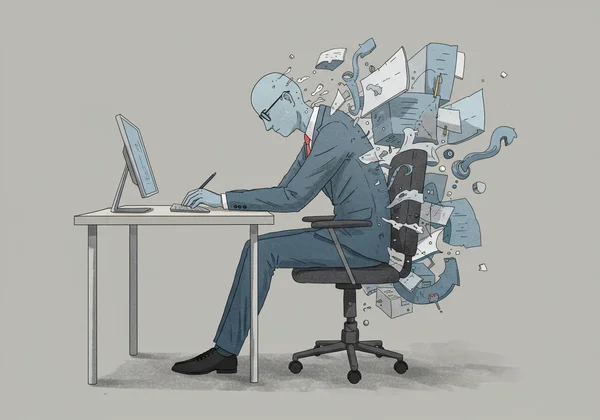Causes of Burnout: When to Take a Free Burnout Test
August 17, 2025 | By Eleanor Vance
Feeling drained, cynical, and detached from your work? If you’ve been pushing yourself to the limit only to feel more exhausted and less effective, you're not alone. Many professionals believe burnout is just a synonym for working too hard, but the reality is far more complex. The true causes of burnout often lie deep within our work environment and our relationship with our job. So, why am I burnt out? This is a question that deserves a clear, compassionate answer.
This article delves into the six core factors, identified by pioneering researchers like Christina Maslach, that contribute to occupational burnout. It’s not just about long hours; it's about the conditions under which you work. Understanding these drivers is the crucial first step toward recognizing your own situation and reclaiming your well-being. To see how these factors are impacting you personally, you can assess your personal risk with a science-backed tool.

Why You Feel Burnt Out: Key Workplace Stressors
The most immediate contributors to burnout are often tied to your daily tasks and interactions. These are the tangible, day-to-day pressures that can erode your energy and passion over time. When these workplace stressors become chronic, they pave the way for emotional exhaustion and a sense of detachment from a job you may have once loved.
Factor 1: Unmanageable Workload and Lack of Control
The feeling of being perpetually swamped is a primary driver of burnout. This isn't just about having too much to do; it's about having a workload that feels impossible to manage within a reasonable timeframe. When the demands consistently exceed your capacity, your body and mind remain in a constant state of high alert, leading directly to emotional exhaustion.
Compounding this is a lack of control or autonomy over your work. If you have little say in your deadlines, assignments, or how you approach your tasks, it creates a sense of powerlessness. You're a passenger on a speeding train with no access to the brakes. This combination of high demand and low control is a scientifically recognized recipe for severe stress and, ultimately, burnout. If this sounds familiar, it might be time for a workplace stress test.
Factor 2: Insufficient Reward and Recognition
Everyone needs to feel that their contributions matter. Reward isn't just about salary; it encompasses financial, social, and intrinsic validation. Insufficient reward occurs when there's a significant gap between the effort you pour into your job and the recognition you receive in return. This could be a stagnant salary, a lack of promotions, or, just as importantly, a chronic absence of praise and appreciation from superiors and colleagues.
When your hard work goes unnoticed or is taken for granted, it fosters a deep sense of cynicism. You might start to think, "Why bother trying so hard if it makes no difference?" This erosion of motivation is a classic symptom of burnout and a sign that your workplace isn't meeting a fundamental human need for acknowledgment.
Factor 3: Breakdown of Community and Support
Humans are social creatures, and a supportive workplace community is a powerful buffer against stress. This includes having positive, trusting relationships with your colleagues and a sense of belonging to a team. When this community breaks down—due to unresolved conflict, a lack of trust in leadership, or a culture of isolation—you lose a vital source of emotional support.
Working in a socially toxic or unsupportive environment is incredibly draining. You may feel isolated, misunderstood, or even actively undermined by those around you. This social friction adds another layer of stress to your daily workload, making it harder to cope and easier to burn out. Understanding if this is a key factor for you is a major benefit of taking a comprehensive Job Burnout Test.

Uncovering Your Personal Risk Factors for Burnout
Beyond the immediate stressors of your workload and team dynamics, burnout is also fueled by deeper, more systemic issues. These risk factors for burnout relate to the core culture of your organization and how your personal values align with your professional life. Identifying these can be a powerful moment of clarity.
Factor 4: Absence of Fairness and Equity
A sense of fairness is fundamental to a healthy work environment. When you perceive that decisions regarding promotions, assignments, and pay are made unjustly, or that there's favoritism at play, it can be incredibly demoralizing. This absence of fairness breeds resentment, cynicism, and a loss of trust in the organization and its leadership.
This issue goes beyond simply feeling like you were passed over for a project. It’s about the belief that the system is rigged and that your efforts won't be judged on their own merit. This corrosive feeling undermines your respect for the workplace and your motivation to contribute meaningfully, making it a significant risk factor for burnout.
Factor 5: Mismatch in Values and Meaning
Perhaps one of the most profound causes of burnout is a conflict between your personal values and the values of your organization. You might be asked to do work that you find unethical, meaningless, or that directly contradicts what you believe is important. This values conflict creates a deep internal struggle, forcing you to act against your own principles day after day.
Similarly, if your work provides no sense of purpose or meaning, your personal achievement can plummet. You may feel like your efforts contribute to nothing of value, leading to feelings of inefficacy and detachment. An online burnout assessment can help you pinpoint whether a values mismatch is at the heart of your dissatisfaction.
Factor 6: Chronic Work-Life Imbalance
While burnout is more than just long hours, a chronic work-life imbalance is undeniably a critical factor. When your job consistently intrudes upon your personal time, it robs you of the ability to rest, recover, and engage in activities that replenish your energy. Your personal life, relationships, and hobbies are essential for resilience.
This imbalance isn't just about the number of hours you're clocked in; it's about the mental space your job occupies. If you're constantly checking emails after hours, worrying about projects on weekends, or unable to mentally disconnect, your system never gets the chance to recharge. This constant drain on your personal resources leaves you vulnerable and depleted, accelerating the path to burnout.
Take Control: From Understanding Causes to Taking Action
Recognizing the causes of burnout is a powerful act of self-awareness. It shifts the narrative from "What's wrong with me?" to "What is happening around me?". You now know that an overwhelming workload, a lack of recognition, a toxic community, unfairness, a values conflict, or a poor work-life balance are the real culprits. These are not personal failings; they are systemic issues.
Now that you understand the 'why,' it's time to discover your specific burnout profile. Knowledge is the first step, but action is what creates change. We encourage you to Take our free Burnout Test today. It’s confidential, based on the established principles of the Maslach Burnout Inventory (MBI), and provides you with an instant summary of your risk level. For deeper insights, you can also unlock an AI-driven report to get a personalized assessment and actionable guidance. Your well-being matters—start your assessment now.

Frequently Asked Questions About Burnout Causes
What can burnout be mistaken for?
Burnout is often mistaken for stress, anxiety, or depression. While they share symptoms like fatigue and low mood, the key difference is the context. Burnout is specifically an occupational phenomenon—it's tied directly to your work environment. While stress can be a precursor, burnout involves a triad of symptoms: emotional exhaustion, cynicism or detachment from your job, and a sense of reduced personal accomplishment that is unique to the workplace.
Is it burnout or am I just lazy?
This is a common and often painful question, but the answer is clear: burnout is not laziness. Laziness is typically characterized by an unwillingness to exert oneself, whereas burnout is an inability to do so due to profound physical and emotional exhaustion. If you once were motivated and engaged but now feel depleted and incapable of mustering the energy, you are likely experiencing burnout, not a character flaw. The best way to differentiate is to self assess burnout with a structured tool.
Who is primarily at fault for burnout?
While individual factors like personality and coping mechanisms can play a role, research overwhelmingly points to the organization and work environment as the primary cause of burnout. The six factors discussed—workload, control, reward, community, fairness, and values—are all largely determined by company culture, management practices, and job design. Shifting the focus from individual blame to organizational responsibility is essential for preventing and addressing burnout effectively.